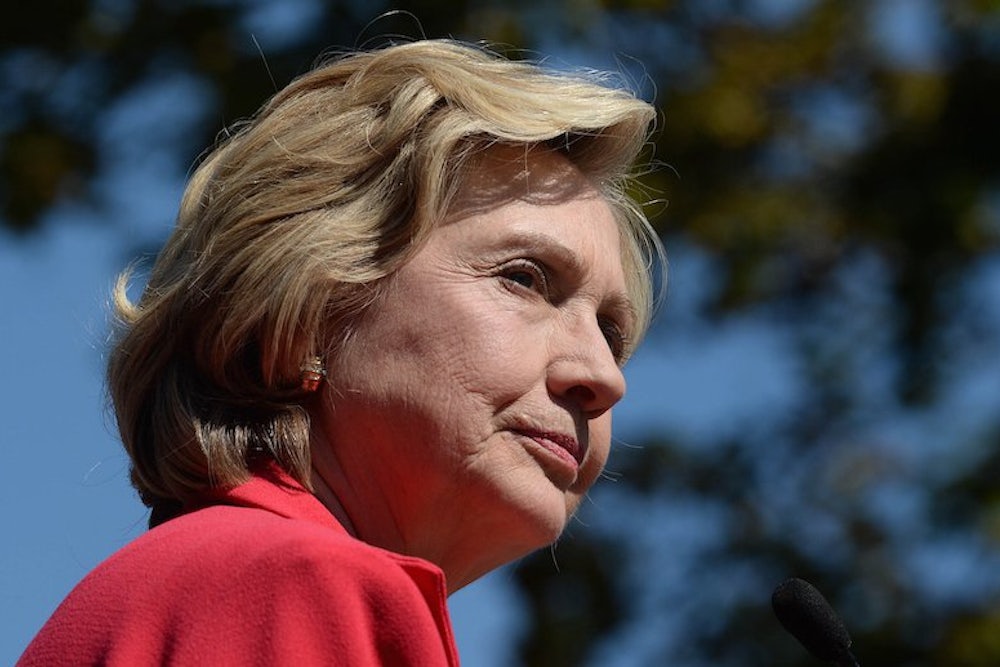Hillary Clinton’s long-awaited testimony before the House Select Committee on Benghazi Thursday has captured the attention of the political world, not because of any mystery about what happened in Lybia on September 11, 2012, but because of of the relatively high probability that someone will screw up. Witnesses before hostile congressional committees are captive to their interrogators, which makes them prone to error, and their interrogators prone to excess. When Planned Parenthood president Cecile Richards testified before a different investigative committee last month, Republicans attacked her egregiously and were roundly criticized for it afterward, including by their conservative allies, for their behavior. The same thing might happen when they have Hillary Clinton under oath.
But unlike the investigative committee that grilled Richards, the Benghazi Committee is in the midst of an existential crisis. Its affected air of seriousness has been punctured by Republican admissions that it was empaneled to damage Clinton politically. One former staffer—an Air Force intelligence officer—has come forward alleging he was fired for investigating the Benghazi attacks, rather than Clinton specifically. The committee’s chairman, Trey Gowdy, turns out to have uncomfortably close ties to the treasurer of an anti-Hillary PAC, which aired a grotesquely exploitative ad tying her to the death of Ambassador Chris Stevens.
Under the circumstances, it stands to reason that Republicans won’t bark and holler at Clinton but will instead be excessively genteel and restrained, while honing in on details designed to paint her in an unflattering light. If that’s the tack they take it’ll demonstrate uncharacteristic restraint. What it won’t demonstrate is that long-debunked Benghazi conspiracy theories have genuine merit.
The mildest but most politically acceptable Benghazi conspiracy theory holds that in the aftermath of the attacks, the Obama administration fabricated a claim that the attack on our outpost there grew out of a spontaneous protest, in order to mislead the country into believing we weren’t caught off guard by a planned act of terrorism.
There is ample evidence demonstrating that this theory is false. But there are also plenty of ways to create the impression that it’s true. For instance, the Benghazi committee’s Democrats recently compiled a report based on every interview the panel has conducted to date. Their conclusion, though partisan, reflects the well substantiated view that none of the Republican-fueled Benghazi allegations and conspiracy theories—including the aforementioned coverup theory—have any merit. However, the same report includes call notes from a September 12, 2012 conversation between Clinton and then-Egyptian Prime Minister Heshvan Kandi in which Clinton said, “We know that the attack in Libya had nothing to do with the film. It was a planned attack—not a protest.”
Subsequent revelations cast this initial assessment into doubt, driving the intelligence analysis temporarily toward the incorrect conclusion that a protest gave rise to the attack. But stripped of that context, it looks like Clinton and the Obama administration knew full well, all along, that the attack was premeditated, and then lied about it. An overwhelming number of Benghazi leaks and allegations involve the same kind of deceptive decontextualization, and have turned the true history of the attacks into a cynical and exploitative hall of mirrors.
Clinton has already addressed these apparent-but-not-actual inconsistencies at length, as has basically everybody swept up in the process of sorting out what really happened. In June of last year, she told Fox, “This was the fog of war. My own assessment careened from the video had something to do with it, the video had nothing to do with it; it may have affected some people, it didn’t affect other people…. So I was trying to make sense of it. And I think that the investigations that have been carried out basically conclude we can’t say that everybody was influenced and we can’t say everybody wasn’t, but what the intelligence community said was spontaneous protests, and that is what at the time they thought."
The aftermath of the attack in Benghazi was marked by genuine confusion, which took a great deal of time and effort to sort out. That’s the nature of chaotic events. Years later, it's possible to isolate stray thoughts, or comments, or preliminary conclusions that make it look like all the facts were known right away, and that the administration’s initial vagueness and uncertainty was a product of intentional dissembling. This is the tack I expect Benghazi committee Republicans to take. To wind the tape on all of this back to the week and months after the attacks, when conspiracy theories first took hold, because it still wasn’t clear who knew what, and when. And they can do that without subjecting Clinton to the kind of abuse so many people expect them to.
